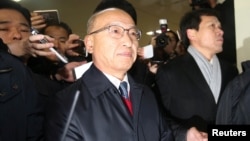A court has convicted South Korea’s former health minister of pressuring the country’s pension fund to support a merger of two Samsung companies.
The merger was crucial in Samsung’s father-to-son leadership succession but faced opposition from U.S. hedge fund Elliott Associates and other minority shareholders. Support from the National Pension Service was crucial to ensure shareholder approval.
The Seoul Central District Court said Thursday that Moon Hyung-pyo, the former health chief who oversaw the National Pension Service, was sentenced to 2½ years in prison. He was found guilty of abusing power to sway the pension fund’s vote on the 2015 merger of Samsung C&T and Cheil Industries.
Ruling on key players
The ruling is among the first on key players in the corruption scandals that ensnared the country’s ousted president and Samsung’s heir.
A former executive at the pension fund was also found guilty of causing damages to the fund by swaying its investment committee to support the Samsung merger. Hong Wan-sun, a former head of the fund’s operation division, was sentenced to 2½ years in prison.
The court said Hong swayed the vote even though he knew that the merger ratio was unfair to Samsung C&T shareholders and hence it would cause damages to the pension fund’s stake in the construction company.
Corruption scandal trigger
The 2015 Samsung merger and the allegations that the pension service was pressured to support Samsung’s succession plan were among the triggers of the massive corruption scandals that led to the impeachment of Park Geun-hye in March and the arrest of Lee, Samsung’s de facto leader.
Prosecutors have accused Lee, who is on trial for bribing Park Geun-hye and her long-time friend, of offering bribes in exchange of seeking the government’s support of the smooth leadership transition at Samsung, including the merger.
The allegations that the pension fund, which manages $508 billion for South Koreans’ post-retirement, supported the controversial Samsung merger despite financial damages angered public and it was one of the reasons that prompted South Koreans to stage massive demonstrations for months last fall.




